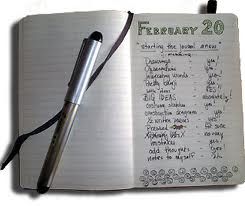Diet
Hate Diet Journaling? 5 Tricks To Make It Easier
Diet journaling, the dreaded but necessary evil of weight loss
Posted July 26, 2012

Few people enjoy the dreaded task of keeping a diet journal—this is where you write down (or punch into your phone) every morsel you put in your mouth. Not only is it time consuming but it is a virtual mirror in the face showing you exactly what you ate, which prevents the head from resting in that comfy place in the sand. How can I conveniently forget the chocolate cake if I have to put it down in my own permanent record? Then there is the issue of buzz kill. You are looking forward to a fabulous dinner at your favorite Italian restaurant until you consult your handy dandy calorie counter which informs you that your favorite chicken parmesan has 1090 calories!
Although diet journaling is a drag, it really is a necessary evil. Study after study shows that how often one keeps a diet journal during a weight loss attempt is directly related to the amount of weight lost. Our “eyeball” estimates of how many calories we consume are just not accurate. Journaling also forces you to be mindful of your dietary decisions. Because journaling is so instrumental to your weight loss success, here are a few tricks that may make the dreaded task a little easier.
Journal Vacations—Diet journaling is not meant to be a lifelong daily task. In fact, when you start a weight loss attempt, I suggest committing to about 3 months of daily journaling. At that point if you are still losing weight, try scheduling diet journal “vacations.” Take a week off every 3 weeks to give yourself a break. Be sure not to approach these off weeks as healthy eating vacations though. The idea is to apply what you learned from journaling to accurately estimate portion sizes and calories without the journal. Eventually you can phase the journal out as long as you are losing weight, only bringing it back in if you plateau or begin to regain.
Baby Steps—Those of you who haven’t started journaling probably just had a “gulp!” reaction to the 3 months of daily journaling recommendation above. If you have not started journaling because it seems so overwhelming, start small. I suggest journaling 1-2 days a week (one weekday, one weekend) to begin honing the habit. If that seems like too much, you might even start by journaling for certain hours of the day. I suggest 3pm to bedtime, since this is the timeframe in which people have the greatest variability in their diets and tend to overeat the most. Any little bit you can do to get started is better than none at all.
Confront the Beast—

Confront the Beast—
Forget Calories—Not something I typically say, but one alternative to calorie counting is portion counting. If you have a very hard time tracking all the calories you eat, you might instead track the number of portions of meat/protein, starch, fruit/vegetables, sweets, oils/fats, and dairy, you consume each day. The objective would be to try to reduce the number of portions of foods that likely account for a lot of calories (e.g., meat, sweets, starch, fats) and increase portions of foods that are low in calories (e.g., fruit/vegetables). Even though calorie counting is more precise, if you lose weight from this approach, then you may not need to count calories. To learn what a true portion size is, check out this link for great portion analogies (e.g., 1 portion of cheese = a pair of dice).
Buddy System—

Buddy System—
Got any other tips for making diet journaling easier? Enter as a comment and share with readers!
----------------------------------------------------------------------------------------------------------------------------------------------
Dr. Pagoto also blogs at her main website, www.FUdiet.com.


